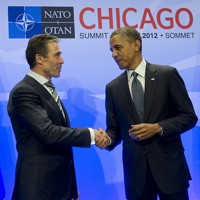This week’s NATO Summit in Chicago, attended by the heads of state and government of alliance member states as well as senior representatives of various NATO partner countries and organizations, was less ambitious than some recent summits. With regard to the alliance itself, the summit announced no new members, or even a timetable for the four aspirant countries, and raised no funds for collective missions, as in Afghanistan. That said, the summit did perform the important function of reaffirming that despite their economic problems, member countries have been fulfilling all the vague commitments they made at the November 2010 Lisbon Summit, where the alliance adopted a new Strategic Concept. More generally, the summit also allowed the allies to renew their mutual solidarity amid all the recent talk of the U.S. pivot to Asia.
The issue that drew the most attention in Chicago was how long NATO would continue its large-scale combat efforts in Afghanistan. The summit reaffirmed the timetables adopted at the Lisbon Summit while adding some new milestones. NATO members and coalition partners in the International Security Assistance Force (ISAF) also pledged in principle to continue some kind of military presence in Afghanistan beyond 2014, though with a different name and mission.
With regard to Afghanistan, NATO leaders and their partners must balance the conflicting demands of their domestic and international audiences. The alliance must communicate to the Taliban and other Afghans, as well as to their neighbors in Pakistan, that NATO will stay in Afghanistan as long as necessary to secure a just and enduring Afghan peace agreement. But alliance leaders must make their domestic publics believe that coalition forces will leave Afghanistan as soon as possible, while reducing their commitments rapidly until then. In the past, NATO leaders have finessed the troop withdrawal issue by allowing Canada and other countries to announce that they have removed all their combat troops from Afghanistan, while keeping almost as many troops in the country in non-combat roles, such as training and advising the Afghan Security Forces. This seems to be the approach adopted with regard to newly elected French President François Hollande’s pledge to withdraw French troops by the end of 2012.

